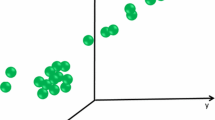Abstract
An important problem in the study of moving objects is the identification of stops. This problem becomes more difficult due to error-prone recording devices. We propose a method that discovers stops in a trajectory that contains artifacts, namely movements that did not actually take place but correspond to recording errors. Our method is an interactive density-based clustering algorithm, for which we define density on the basis of both the spatial and the temporal properties of a trajectory. The interactive setting allows the user to tune the algorithm and to study the stability of the anticipated stops.
Access this chapter
Tax calculation will be finalised at checkout
Purchases are for personal use only
Preview
Unable to display preview. Download preview PDF.
Similar content being viewed by others
References
Alvares, L.O., Bogorny, V., Kuijpers, B., de Macêdo, J.A.F., Moelans, B., Vaisman, A.A.: A model for enriching trajectories with semantic geographical information. In: GIS, Seite 22 (2007)
Ankerst, M., Breunig, M.M., Kriegel, H.P., Sander, J.: Optics: Ordering points to identify the clustering structure, pp. 49–60. ACM Press, New York (1999)
Ester, M., Kriegel, H.P., Sander, J., Xu, X.: A density-based algorithm for discovering clusters in large spatial databases with noise. In: Proceedings of the 2nd Conference on Knowledge Discovery and Data Mining, pp. 226–231. AAAI Press, Menlo Park (1996)
Han, J.: Data Mining: Concepts and Techniques. Morgan Kaufmann Publishers Inc., San Francisco (2005)
Kalkusch, M., Lidy, T., Knapp, M., Reitmayr, G., Kaufmann, H., Schmalstieg, D.: Structured visual markers for indoor pathfinding (2002)
Kolmogorov, A.N.: Grundbegriffe der Wahrscheinlichkeitsrechnung. Springer, Berlin (1933)
Liao, L., Fox, D., Kautz, H.: Extracting places and activities from gps traces using hierarchical conditional random fields. Int. J. Rob. Res. 26(1), 119–134 (2007)
Nanni, M., Pedreschi, D.: Time-focused clustering of trajectories of moving objects. J. Intell. Inf. Syst. 27(3), 267–289 (2006)
Palma, A.T., Bogorny, V., Kuijpers, B., Alvares, L.O.: A clustering-based approach for discovering interesting places in trajectories. In: SAC 2008: Proceedings of the 2008 ACM symposium on Applied computing, pp. 863–868. ACM, New York (2008)
Spaccapietra, S., Parent, C., Damiani, M.L., de Macedo, J.A., Porto, F., Vangenot, C.: A conceptual view on trajectories. Data Knowl. Eng. 65(1), 126–146 (2008)
Zheng, Y., Li, Q., Chen, Y., Xie, X., Ma, W.-Y.: Understanding mobility based on gps data. In: UbiComp 2008: Proceedings of the 10th Int. Conf. on Ubiquitous computing, pp. 312–321. ACM, New York (2008)
Author information
Authors and Affiliations
Editor information
Editors and Affiliations
Rights and permissions
Copyright information
© 2009 Springer-Verlag Berlin Heidelberg
About this paper
Cite this paper
Zimmermann, M., Kirste, T., Spiliopoulou, M. (2009). Finding Stops in Error-Prone Trajectories of Moving Objects with Time-Based Clustering. In: Tavangarian, D., Kirste, T., Timmermann, D., Lucke, U., Versick, D. (eds) Intelligent Interactive Assistance and Mobile Multimedia Computing. IMC 2009. Communications in Computer and Information Science, vol 53. Springer, Berlin, Heidelberg. https://doi.org/10.1007/978-3-642-10263-9_24
Download citation
DOI: https://doi.org/10.1007/978-3-642-10263-9_24
Publisher Name: Springer, Berlin, Heidelberg
Print ISBN: 978-3-642-10262-2
Online ISBN: 978-3-642-10263-9
eBook Packages: Computer ScienceComputer Science (R0)




